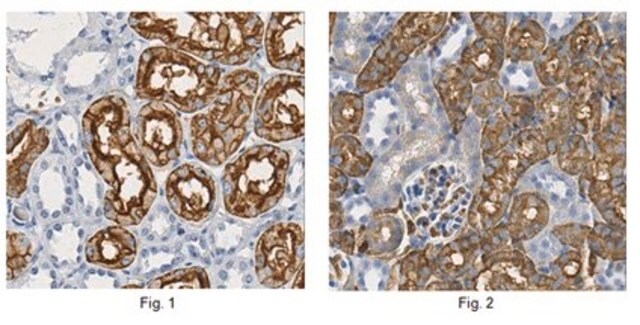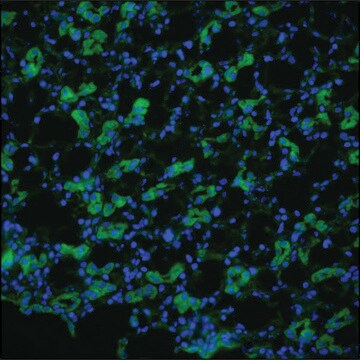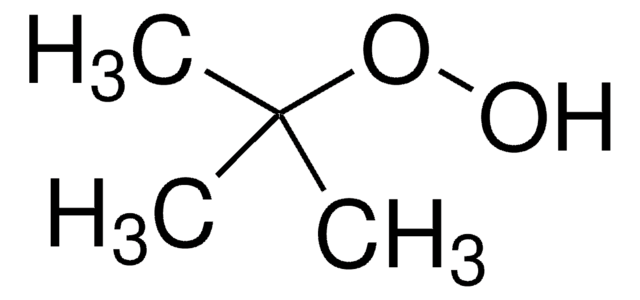A5560
Anti-Water Channel Aquaporin 1 antibody produced in rabbit
IgG fraction of antiserum, lyophilized powder
Sign Into View Organizational & Contract Pricing
All Photos(2)
About This Item
conjugate:
unconjugated
application:
IHC (p)
WB CL
WB CL
clone:
polyclonal
species reactivity:
rat, human
citations:
6
technique(s):
immunohistochemistry (formalin-fixed, paraffin-embedded sections): suitable
western blot (chemiluminescent): 1:400-1:800
western blot (chemiluminescent): 1:400-1:800
Recommended Products
biological source
rabbit
Quality Level
conjugate
unconjugated
antibody form
IgG fraction of antiserum
antibody product type
primary antibodies
clone
polyclonal
form
lyophilized powder
species reactivity
rat, human
technique(s)
immunohistochemistry (formalin-fixed, paraffin-embedded sections): suitable
western blot (chemiluminescent): 1:400-1:800
UniProt accession no.
storage temp.
−20°C
target post-translational modification
unmodified
Gene Information
human ... AQP1(358)
rat ... Aqp1(25240)
General description
Aquaporins are transmembrane proteins composed of 6 α helices that regulate the flow of water across the membrane. AQP1 is highly expressed on the apical membrane of kidneys.
Rabbit Anti-Water Channel Aquaporin 1 antibody binds to human and rat aquaporin 1.
Immunogen
synthetic peptide corresponding to amino acids 243-261 of human aquaporin 1 conjugated to KLH with glutaraldehyde. The epitope is identical in human, rodent, and cattle and only slightly different in frog.
Application
Rabbit Anti-Water Channel Aquaporin 1 antibody has been used for immunocytochemical assays. The product can also be used for immunohistochemistry and western blot.
Physical form
Lyophilized from phosphate buffered saline, pH 7.4, and 0.025% sodium azide
Preparation Note
Isolated on immobilized Protein A
Disclaimer
Unless otherwise stated in our catalog or other company documentation accompanying the product(s), our products are intended for research use only and are not to be used for any other purpose, which includes but is not limited to, unauthorized commercial uses, in vitro diagnostic uses, ex vivo or in vivo therapeutic uses or any type of consumption or application to humans or animals.
Not finding the right product?
Try our Product Selector Tool.
related product
Product No.
Description
Pricing
Storage Class Code
11 - Combustible Solids
WGK
WGK 3
Flash Point(F)
Not applicable
Flash Point(C)
Not applicable
Personal Protective Equipment
dust mask type N95 (US), Eyeshields, Gloves
Choose from one of the most recent versions:
Already Own This Product?
Find documentation for the products that you have recently purchased in the Document Library.
Elisabeth Kruse et al.
Genome biology, 7(2), 206-206 (2006-03-09)
Water is the major component of all living cells, and efficient regulation of water homeostasis is essential for many biological processes. The mechanism by which water passes through biological membranes was a matter of debate until the discovery of the
Kamila Foguesatto et al.
Cell biology international, 46(6), 976-985 (2022-03-09)
The physiological variations during the crustacean molting cycle have intrigued researchers for many years. Maintaining osmotic homeostasis in the face of hemolymph dilution and dealing with dynamic intracellular and extracellular calcium fluctuations are challenges these animals continuously confront. It has
R T Boyle et al.
Bulletin of environmental contamination and toxicology, 90(3), 387-390 (2013-01-01)
We used immunocytochemical and fluorometric techniques to show that gill cells of two marine invertebrates, the crab Neohelice granulata (osmoregulator) and the clam Mesodesma mactroides (osmoconformer), increase the expression of membrane transporters [Na(+)/K(+)-ATPase and aquaporin (AQP1)] after whole-animals exposure (96 h)
Caroline T Rocha et al.
Archives of environmental contamination and toxicology, 62(1), 56-67 (2011-04-29)
The objective of this study was to evaluate the influence of lead (Pb) on regulatory proteins linked to mechanisms of animal adaptation to polluted environments (using in vivo and in vitro tests) and to validate the in vitro assay as
Esperanza Gonzalez et al.
International journal of biological sciences, 17(8), 1864-1877 (2021-06-17)
Alcohol abuse has a high impact on the mortality and morbidity related to a great number of diseases and is responsible for the development of alcoholic liver disease (ALD). It remains challenging to detect and evaluate its severity, which is
Our team of scientists has experience in all areas of research including Life Science, Material Science, Chemical Synthesis, Chromatography, Analytical and many others.
Contact Technical Service







